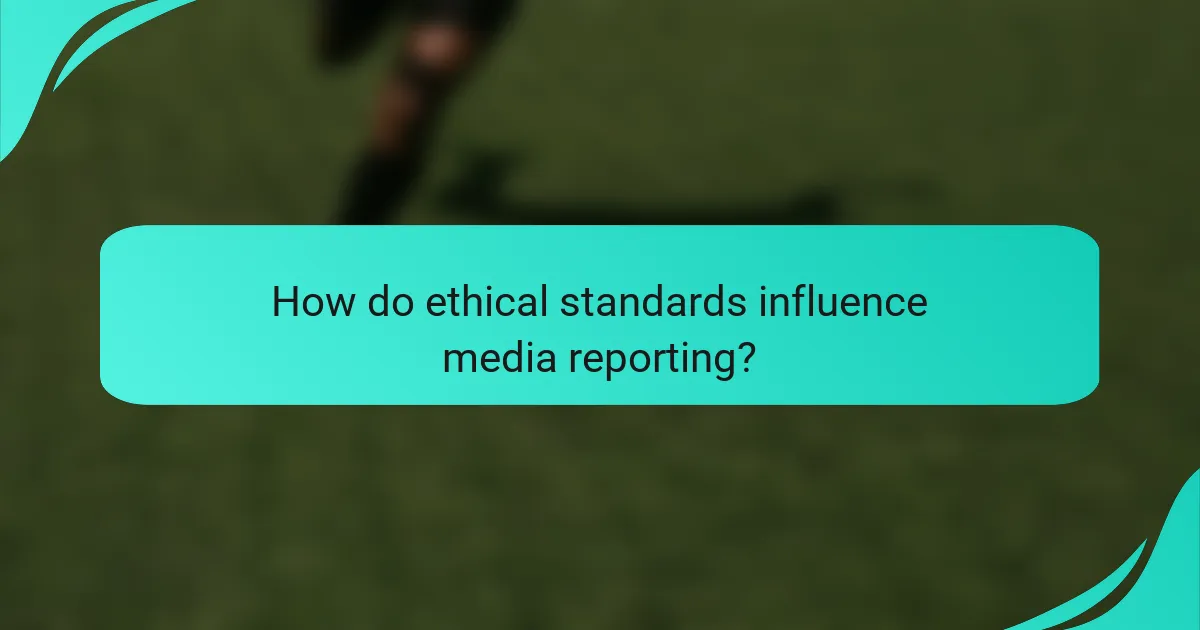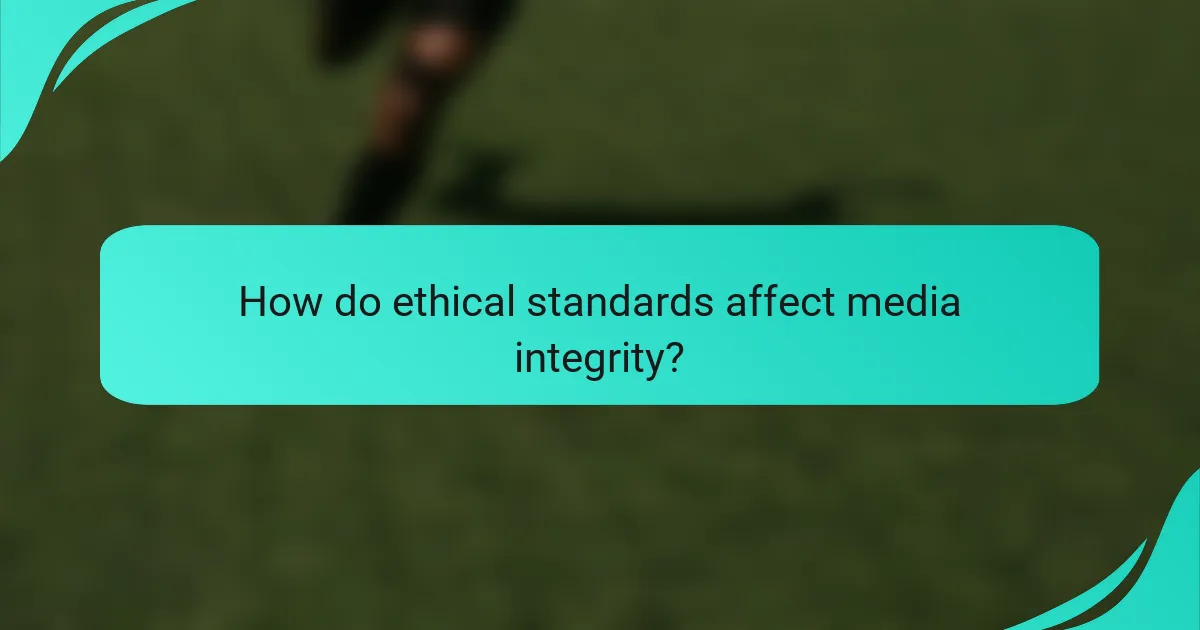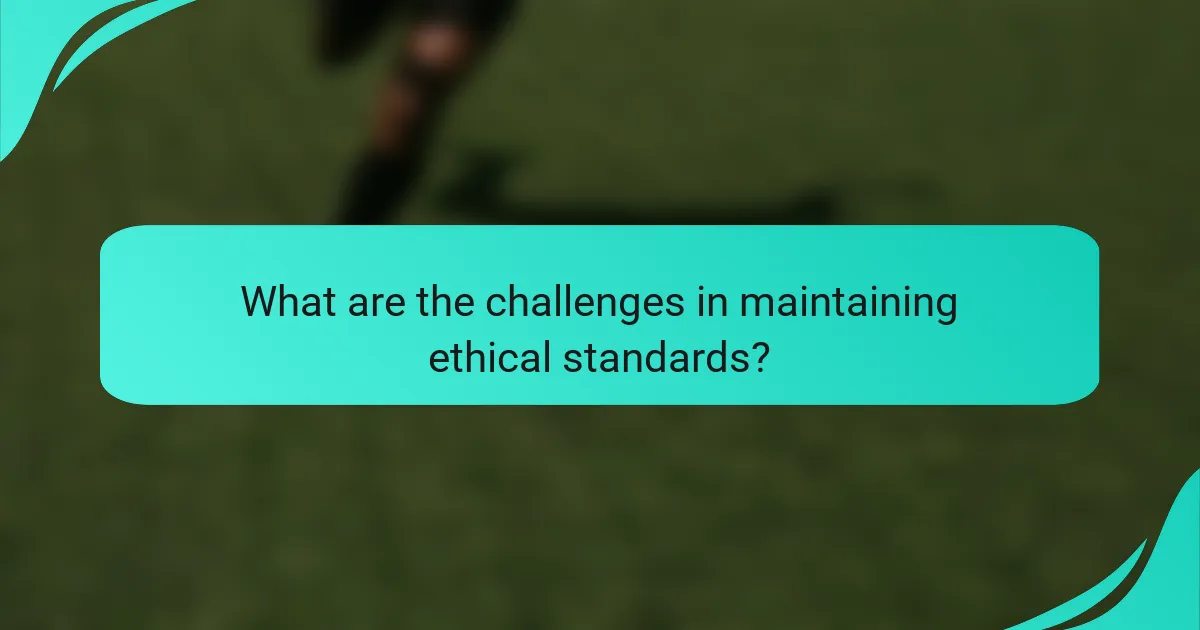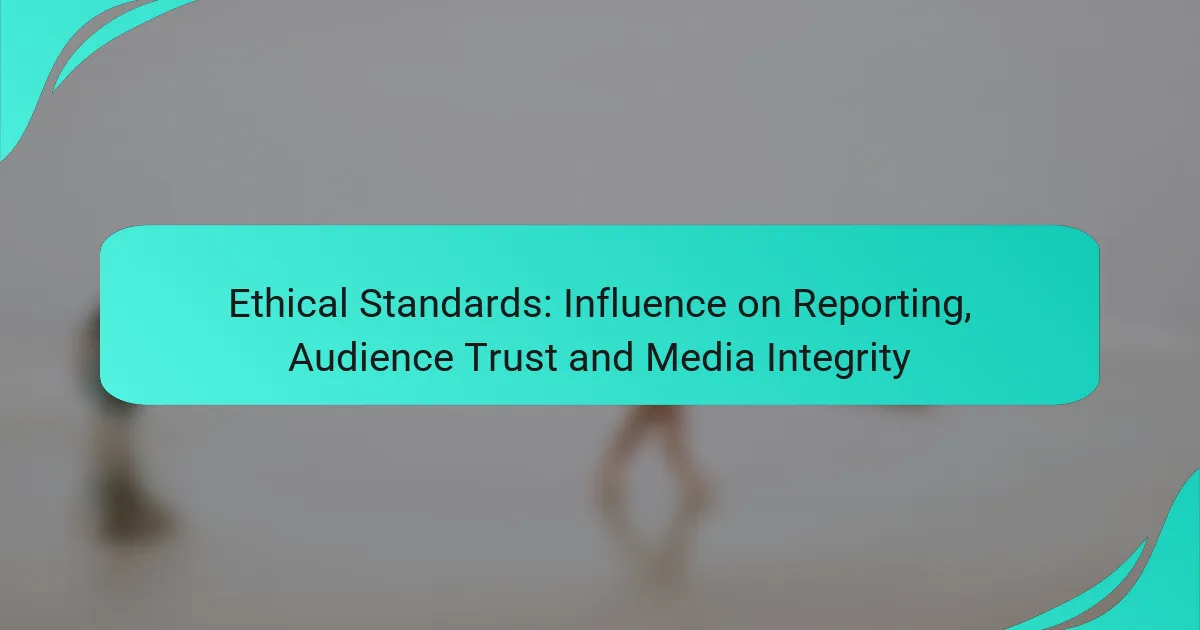Ethical standards are essential in media reporting as they ensure the accuracy and responsibility of the information presented. By guiding journalists in their pursuit of truth, these standards foster trust between the media and its audience, ultimately enhancing the integrity of the reporting process.

How do ethical standards influence media reporting?
Ethical standards play a crucial role in shaping media reporting by ensuring that information is presented accurately and responsibly. These standards guide journalists in their pursuit of truth, fostering trust between the media and its audience.
Promotes accuracy and accountability
Ethical standards promote accuracy in reporting by requiring journalists to verify facts before publication. This commitment to truthfulness holds media outlets accountable for the information they disseminate, encouraging them to correct errors promptly.
For instance, reputable news organizations often have fact-checking processes in place, which can include multiple sources or expert consultations. This diligence helps maintain a high standard of reporting that audiences can rely on.
Enhances credibility of news outlets
Adhering to ethical standards enhances the credibility of news outlets, making them more trustworthy in the eyes of the public. When media organizations consistently follow ethical guidelines, they build a reputation for reliability, which can lead to increased audience loyalty.
For example, outlets that disclose their sources and provide context for their stories are often viewed as more credible. This transparency fosters a stronger connection with the audience, who feel informed and respected.
Reduces misinformation spread
Ethical standards help reduce the spread of misinformation by emphasizing the importance of thorough research and verification. Journalists are trained to critically evaluate sources and information, which minimizes the likelihood of inaccurate reporting.
In practice, this means that reputable media organizations will often refrain from publishing sensational claims without substantial evidence. By prioritizing accuracy over speed, they contribute to a more informed public discourse and help combat the rise of fake news.

What is the impact of ethical standards on audience trust?
Ethical standards significantly enhance audience trust by ensuring transparency, accuracy, and accountability in reporting. When media organizations adhere to these principles, they foster a sense of reliability among their audiences, which is crucial for maintaining credibility.
Builds long-term relationships with audiences
By consistently applying ethical standards, media outlets can cultivate long-term relationships with their audiences. Trust is built over time through reliable reporting, which encourages audiences to return for news and information. For example, a news organization that fact-checks its sources and corrects errors promptly is more likely to retain its readership.
Moreover, ethical practices create a sense of community and shared values between the media and its audience. When audiences feel that their concerns are addressed and their interests are represented, they are more likely to engage with the content and support the organization.
Increases audience engagement and loyalty
Adhering to ethical standards not only builds trust but also boosts audience engagement and loyalty. When audiences perceive a media outlet as trustworthy, they are more inclined to interact with its content, share it on social media, and recommend it to others. This organic promotion can significantly expand the outlet’s reach.
Additionally, ethical reporting can lead to higher retention rates. Audiences are more likely to stay loyal to a media source that consistently provides accurate and fair coverage. For instance, a publication that prioritizes investigative journalism and highlights underreported issues can attract a dedicated following that values in-depth analysis and integrity.

How do ethical standards affect media integrity?
Ethical standards are crucial for maintaining media integrity as they guide journalists in delivering accurate, fair, and unbiased information. These standards help build audience trust and ensure that reporting reflects a wide range of perspectives.
Ensures fair representation of diverse viewpoints
Ethical standards promote the inclusion of various perspectives in reporting, which is essential for a balanced narrative. By actively seeking out voices from different backgrounds and communities, media outlets can provide a more comprehensive understanding of issues.
For example, when covering social issues, journalists should strive to interview representatives from affected groups, ensuring that their stories are told authentically. This practice not only enriches the content but also fosters a sense of belonging among diverse audiences.
Prevents conflicts of interest in reporting
Conflicts of interest can undermine media integrity by skewing reporting to favor certain individuals or organizations. Ethical standards require journalists to disclose any potential conflicts and avoid situations where personal interests could compromise their objectivity.
For instance, a journalist covering a company in which they own stock should recuse themselves from that story to maintain credibility. Media organizations often implement strict policies to manage conflicts, ensuring that their reporting remains trustworthy and impartial.

What frameworks support ethical journalism?
Ethical journalism is supported by various frameworks that provide guidelines and standards for reporting. These frameworks help ensure accuracy, fairness, and accountability, which are essential for maintaining audience trust and media integrity.
Society of Professional Journalists Code of Ethics
The Society of Professional Journalists (SPJ) Code of Ethics is a widely recognized framework that outlines the principles of ethical journalism. It emphasizes the importance of seeking truth, minimizing harm, and acting independently. Journalists are encouraged to provide context and avoid sensationalism.
Key elements of the SPJ Code include verifying information before reporting, being transparent about sources, and correcting errors promptly. For example, a journalist should disclose any conflicts of interest and strive to present diverse perspectives in their reporting.
International Federation of Journalists guidelines
The International Federation of Journalists (IFJ) provides global guidelines that promote ethical standards across different cultures and regions. These guidelines focus on the rights of journalists and the need for freedom of expression while upholding professional integrity. They stress the importance of protecting sources and ensuring that reporting does not incite violence or hatred.
IFJ guidelines encourage journalists to respect the dignity of individuals and communities, particularly when reporting on sensitive issues. For instance, when covering conflicts, journalists should avoid dehumanizing language and strive to portray the complexities of the situation fairly.

What are the challenges in maintaining ethical standards?
Maintaining ethical standards in journalism faces several challenges that can compromise the integrity of reporting. Key issues include external pressures from advertisers and the fast-paced nature of news cycles influenced by social media.
Pressure from advertisers and sponsors
Advertisers and sponsors often exert significant influence on media outlets, which can lead to conflicts of interest. For instance, a news organization may hesitate to publish a critical story about a major sponsor, fearing financial repercussions. This pressure can undermine the objectivity and credibility of reporting.
To navigate these challenges, media organizations should establish clear separation between editorial and advertising departments. Transparency in sponsorships and funding sources can also help maintain audience trust and uphold ethical standards.
Rapid news cycles and social media influence
The speed of news cycles, particularly with the rise of social media, can lead to rushed reporting and a focus on sensationalism over accuracy. Journalists may prioritize breaking news over thorough fact-checking, which can result in the dissemination of misinformation.
To counteract this, journalists should adhere to a strict verification process before publishing. Setting aside time for fact-checking, even in fast-paced environments, is crucial for maintaining credibility. Additionally, promoting media literacy among audiences can empower them to critically evaluate news sources and claims.

How can media organizations improve ethical practices?
Media organizations can enhance ethical practices by prioritizing transparency, accountability, and ongoing education for their staff. By implementing structured training and clear policies, they can foster a culture of integrity that builds audience trust and upholds media integrity.
Implementing training programs for journalists
Training programs for journalists are essential for promoting ethical reporting standards. These programs should cover topics such as fact-checking, bias recognition, and the importance of sourcing. Regular workshops and online courses can help journalists stay updated on best practices and ethical dilemmas they may encounter.
Organizations might consider partnering with established journalism schools or professional associations to develop comprehensive training modules. This collaboration can ensure that training is relevant and reflects current industry standards.
Establishing clear editorial policies
Clear editorial policies provide a framework for ethical decision-making within media organizations. These policies should outline the standards for sourcing, reporting, and corrections, ensuring that all staff understand their responsibilities. Regularly reviewing and updating these policies can help address emerging ethical challenges in the media landscape.
Additionally, involving journalists in the policy-making process can enhance buy-in and adherence. Organizations should also communicate these policies transparently to their audience, reinforcing their commitment to ethical journalism.

What role does technology play in ethical journalism?
Technology significantly influences ethical journalism by enhancing transparency, improving fact-checking, and facilitating audience engagement. It provides tools that help journalists uphold ethical standards while also presenting challenges related to misinformation and privacy.
Enhancing transparency
Technology fosters transparency in journalism through various platforms that allow real-time sharing of information. Journalists can use social media and content management systems to disclose their sources, methodologies, and updates, which builds trust with the audience. For instance, live reporting tools enable journalists to provide immediate context and updates during breaking news events.
Improving fact-checking
With the rise of misinformation, technology plays a crucial role in fact-checking processes. Journalists can leverage online databases, verification tools, and AI-driven software to cross-reference information quickly. For example, tools like Snopes or FactCheck.org allow reporters to validate claims before publication, reducing the risk of spreading false information.
Facilitating audience engagement
Technology enhances audience engagement by allowing for interactive content and feedback mechanisms. Journalists can create polls, comment sections, and multimedia presentations that invite audience participation. This two-way communication not only enriches the reporting process but also encourages accountability and responsiveness to audience concerns.
